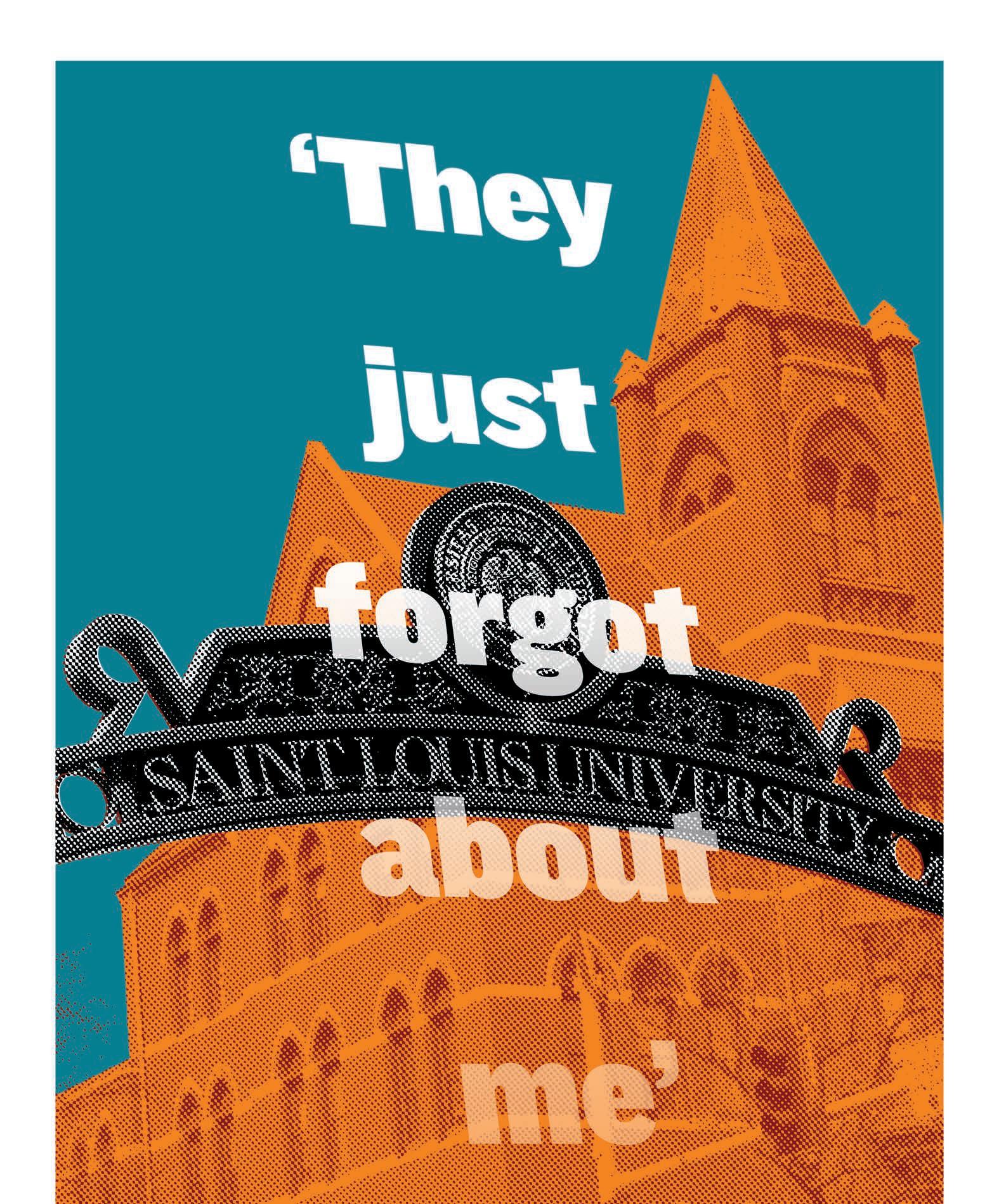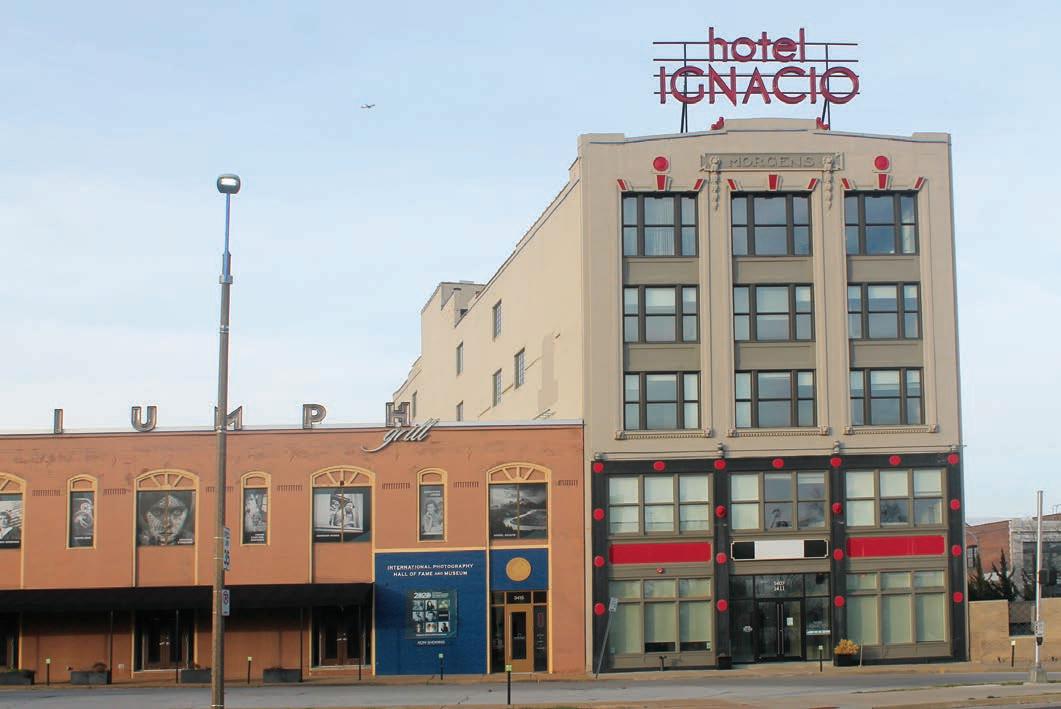
15 minute read
Feature
Inside a quarantine nightmare at Saint Louis University
BY RILEY MACK
On the last Sunday of Saint Louis University’s spring break, the parking lots should have been buzzing. Cars scrambling for parking spaces. Students running to greet friends. Suitcases rolling along West Pine Boulevard toward dorm rooms. Instead, campus was a silent, lifeless version of itself. Residence buildings were devoid of the typical frenzied cacophony of students. The Clocktower, normally a gathering spot in the warm spring weather, sat empty. The iconic campus fountain had been turned off.
All across the country, universities were shutting down to avoid spreading the coronavirus, and now it was SLU’s turn. Students received an email on March 13 from university President Dr. Fred Pestello announcing the suspension of in-person classes through the end of the semester.
Students who had scattered on March 9 for spring break were now learning that they wouldn’t be returning to normal college life any time soon.
“It is apparent that life is changing and sacrifces are demanded of all of us. Rest assured that the team at SLU is keeping the best interests of our students, patients and employees at the center of our decision making,” Pestello’s email read.
In the following weeks, students fltered in and out of campus to clear out their dorms, stacking boxes in their cars and sharing socially distant goodbyes as the residence buildings were closed with no frm date for when they would reopen.
For the rest of the semester, students attended classes online. Instead of crowded lecture halls and late nights in the library, they video conferenced from off-campus housing or studied in their parents’ homes.
Finally, on May 26, 2020, SLU’s administration announced they would allow more than 11,000 students to return to the university for the fall semester. COVID-19 infections had continued to increase since the campus’ initial lockdown, but the university assured students they had plans in place for a safe return.
In August, the wrought-iron gates of Saint Louis University creaked open for the school year once again, allowing a food of students to move back to campus for an in-person fall semester. After fve months away from campus, the atmosphere was warm with a socially distanced welcome.
The administration moved swiftly to set up strict health protocols on campus. The plan included repurposing a university-owned hotel and dormitory buildings for quarantine housing to isolate students when some inevitably caught the virus.
In theory, the students sent to quarantine housing would be provided top-notch care, including regular meal deliveries and copious support from the university. But that’s not how it played out, according to multiple students who endured two-week stays in isolation. In interviews, they describe spending long days alone and neglected, with no one from the university checking on them or even bringing them food.
“They just forgot about me,” a student who works for the university says about her on-campus stay in isolation.
The issues with quarantine housing weren’t the only problems with the university’s response to the challenges of the pandemic. Resident advisors say SLU tasked them with enforcing COVID-19 rules in student housing with no formal training, leaving them to break up maskless parties and face dangerous conditions in person.
In a plethora of emails from university administrators to the student body throughout the 20202021 school year, the messaging began to transform from upbeat to a more harsh, reprimanding tone. COVID-19 had continued to spread, and students say the university increasingly blamed them at a time when they were physically and mentally grappling with the effects of the pandemic.
One email from early February, entitled “Breaking point or turning point?”, warned that SLU was “on the brink of implementing severe COVID-19 restrictions because some students, it appears, have just given up.” The email said that students should have “no more beerpong parties,” among a list of other fagrant actions.
The email continued: “Don’t spend Mardi Gras ‘day drinking’ instead of going to class. (Yes, we’ve heard about that plan.) You asked for more mental health days in the calendar, and February 17 is the frst one. Use it as it was intended, not recovering from a day of partying,” wrote Debra Rudder Lohe, the interim vice president for student development at the time.
“Come on. You know better,” Lohe added.
Students say that while the administration was quick to send stern emails, the actual work of enforcing pandemic protocols often fell to the university’s lowest-paid staff. The pressure to bring case numbers down landed hardest on resident advisors in the campus’ residence halls, who were tasked with controlling sometimes noncompliant residents. In multiple cases, it was the RAs who fell sick. When they did, they were shipped off to quarantine housing.
One RA who has worked for the university for two years detailed the dismal conditions of her stay at Grand Forest Apartments quarantine housing. The student, whom we’re calling Abigail, spoke on the condition of anonymity because she fears losing her job at the university.
At one point, Abigail was randomly selected to be tested for COVID-19. Students living oncampus all have a chance to be chosen at random for testing, as part of a campus protocol to prevent spreading the virus. When the test came back positive, she was rushed into isolation housing at midnight, where she would stay for the next fourteen days.
Continued on pg 17


Continued from pg 15

When she arrived at her temporary new home, she says, the bathroom door was locked and the bed, which was without sheets, was covered in unknown stains. Luckily, she says, she was given “a roll of toilet paper.”
“Thank God for that,” she adds.
Things didn’t improve from there. Abigail says she called the Student Health Center’s COVID-19 hotline to have the bathroom door opened, but they said they would have to check if that was feasible and call her back. When they did get back to her, they said someone could arrive in two hours to fx it. The situation had already become so dire that she had to break the door to use the bathroom.
The following days played out in the same vein. Abigail says she was not fed for almost two days after her arrival. When meals fnally arrived, it was food she explicitly stated she could not eat, as she has Coeliac’s disease and is lactose intolerant. She lived off of food dropped off by friends and some of the sides to the meals she was provided.
Only in the last two days of her fourteen-day quarantine did they bring her food that met her dietary restrictions, she says. Even then, she says, it was inedible.
“I like food and I eat anything,” Abigail explains, “but I would throw away all this food. It was gross.”
She also faced bouts with her chronic back pain while in quarantine and called the hotline to ask for Tylenol. When the medication arrived, it was in packaging that she couldn’t open without scissors, which was not provided.
“The frst two nights I couldn’t stop crying,” Abigail recalls. “I was extremely depressed.”
Each time she reached out for help from the Student Health Center, she says, the staff sounded “annoyed” and like “they don’t want to be there.”
“When they just say ‘OK, we’ll try our best,’ and then nothing happens, you just give up,” she says.
Abigail claims that this treatment from her employer was expected. When cases began to rise, SLU Housing and Residence Life turned to RAs to lead a crackdown on regulations inside dormitory buildings. She explained that she has felt unsafe in her job multiple times throughout the pandemic.
“They expect us to go in and bust parties still when people aren’t masked,” she says. “It’s not safe for anybody in that situation.”
Abigail works two jobs on top of being an RA in order to pay for college on her own. The university pays poorly, but she says she needs the secure housing that comes with the job. As is the case with all campus RAs, Abigail works twenty hours a week as a desk worker in her building, on top of the time spent helping students on her foor. She gets paid $100 a month, plus housing and a meal plan. The $100 paycheck is taxed.
Manisha Ford-Thomas, director of SLU Housing and Residence Life, addresses allegations of mistreatment of RAs during an interview with the RFT.
“I’ve heard students say, ‘We’re expected to work twenty hours, and I’m working 25.’ I know we have professional staff who have sat down with them and talked about what time management looks like,” she says.
“It is never our intention to overwork students, to overburden them, because what we know to be true is that they’re here to get a degree frst and foremost,” Ford-Thomas says.
Abigail also alleges that $100 was taken out of her account without her knowledge in December by Housing and Residence Life and that she hasn’t been paid the monthly stipend since. She is currently working with her boss to fx the situation. “From the higher-ups, I don’t think they really see students as people,” Abigail says. “They mostly see numbers, and that’s it.” Sarah Cunningham, SLU’s vice president of student development, tells the RFT that the administration is committed to improving its support for students during the pandemic. She points to a survey sent to nearly 500 students who were quarantined or isolated. Of the 215 students who responded, the majority rated their experiences as positive, she says. Cunningham acknowledges some students did report negative quarantine experiences in the survey, and she says the university has looked for ways to provide more support. Cunningham says that more staff were added to the isolation housing team before the spring semester as a result of students’ grievances.
“As soon as staff were alerted to problems, a misdelivery of meals with dietary restrictions or missing meals or pictures of food that were unsatisfactory, the staff worked their quickest to fx it,” Cunningham says. “We planned our best and learned that we could’ve done better, and as soon as we fgured that out, we did better.”
Another student, whom we’re calling Beth to protect her identity, describes a similarly problematic
Saint Louis University converted Hotel Ignacio into quarantine housing in anticipation of students catching COVID-19. | RILEY MACK
Each time Abigail reached out for help from the Student Health Center, she says the staff sounded “annoyed” and like “they don’t want to be there.” “When they just say ‘OK, we’ll try our best,’ and then nothing happens, you just give up,” she says.
RIVERFRONT TIMES PRESENTS
SATURDAY, APRIL 24, 2021 • CHASE PARK PLAZA 11:30 AM-2:00 PM

RFT’S UNITED WE BRUNCH RETURNS FOR THE 6TH YEAR!!
There’s no better way to chase away a hangover than brunch with friends. And Riverfront Times is once again bringing together the best restaurants in town with one mission: unite to cure St. Louis’ hangover. In its 6th year, United We Brunch will be more than just bottomless Bloody Marys and Mimosas — enjoy screwdrivers, bellinis, Irish coffee, beer and more! Plus, all the best brunch hot spots in the St. Louis area under one roof.
EVERYONE IS VIP IN 2021!
VIP Gift Bag with Commemorative Glass • Brunch Tastings from more than 20 brunch hot spots Bottomless Bloody Marys, Mimosas, Bellinis, Screwdrivers, beer and Irish Coffee
Covid-Protocols: capacity will be significantly reduced, masks required when not consuming beverages/food, social distancing decals, tables spaced apart, individual hand sanitizer provided, and plexiglass between the restaurants and guests.
Continued from pg 17
experience as a second-year RA. Though she signed on for twentyhour workweeks, she often fnds herself working more hours than expected. She says she feels taken advantage of by Housing and Residence Life because they know she needs the RA position in order to remain a student at SLU.
Like Abigail, Beth worries about her safety when doing room checks for residents or entering rooms where people are breaking COVID-19 guidelines.
Ford-Thomas says that putting the health of student staff at risk is never the intention. “The work that we do in Housing and Residence Life is important,” she says, “but I also would never juxtapose that with the health, the wellness of any person on this team.”
“I hear students say that ‘I felt uncomfortable here,’ but that’s when you tap out and you tap someone else in,” she says.
“Someone else can be that next line of defense to get us what we need,” which could be a team member who is a graduate student or someone on the HRL’s professional staff, she says.
“There’s, at no time, a place where I would want anyone to feel unsafe, because that’s not our role,” she concludes.
While Beth was aware that Housing and Residence Life provides assistance in these unsafe situations, she says that the RAs would still have to enter the room and interact with the students, even if another staff member was present.
At a recent meeting with Housing and Residence Life, Beth claims RAs were blamed for higher COVID-19 rates in dorms and on-campus apartments. Beth believes RAs were never truly taught how to handle these situations in the frst place.
“I remember back in the fall training people were trying to ask questions and HRL was like, ‘We don’t know, we don’t know, we don’t know,’ and then we never truly got any answers.”
She adds, “There’s always the overall fear that I’ll get in trouble for not enforcing something properly. It feels like walking on a thin line always.”
Beth claims the mistreatment of RAs goes beyond COVID-19. As Black Lives Matters protests spread in early October, Housing and Residence Life sent a document to all student staff, explaining that students are protected under the Speech, Expression and Civil Discourse Policy at SLU to participate in protests.
Yet, toward the end of the document, RAs were warned that “actions taken as an individual can have an impact on your employment with HRL and action may be taken if your actions violate University policy.”
Ford-Thomas insists they weren’t trying to intimidate students.
“We took no stance,” she says. “What we were trying to do is communicate in support of students and what they choose to do.”
Beth argues, “It’s kind of confusing how a bunch of Master’s and Ph.D. people can sit around a table and word something, trying to tell us that we do have the right to protest, and made it sound like we didn’t.”
“I actually chose SLU for their social justice values,” she says. She now believes the university’s handling of their student staff is “extremely frustrating and disappointing.”
Another student who became sick after a night of hanging out with fve other students on her foor in early November also spoke with the RFT on the condition of anonymity.
When one of her friends tested positive for COVID-19, the student, referred to here as Claire, was moved into quarantine at Hotel Ignacio, a functioning hotel owned by SLU that was converted into isolation housing for students. Here, she received no communication from the Student Health Center.
When she eventually did get in touch with their ofce, she says she was called irresponsible and talked down to.
“I was crying on the phone with Student Health for a couple days because I was getting attitude,” she says, “I felt that I was being chastised for catching a virus that I had no control over.”
Cunningham tells the RFT, “There was defnitely never any intention or objective of the university to try to make any student feel like it was their fault.”
“The fact that the students you spoke with felt that way, I feel awful about, that was never the intention,” she continues.
“There is no playbook” for how to handle COVID-19 on campus, she explains.
Due to initially testing negative, Claire says she called every day and begged to take another COVID-19 test in hopes that it would improve her care from the Student Health Center.
“I just wanted someone to call me and ask if I was OK, besides my mom,” she says.
When she was given the opportunity to be tested again, she asked if a golf cart could pick her up for the half-mile walk to the Student Health Center.
“The person that was on the phone was like, ‘What? Are you going to get in trouble for walking or something?’ and I was like, ‘I can’t breathe, I have COVID,’” she says.
Claire ended up walking to the Student Health Center, where she ofcially tested positive and fnally started to receive calls from nurses. Still, the remainder of her stay in isolation was less than ideal.
“The food was absolutely terrible,” she recalls, “I wouldn’t eat dinner because it was so bad.”
Each day at noon, Claire received a prepackaged sandwich and chips, which she would ration out for the rest of the day because dinners were so unappetizing. As for activities to fll her two-week stay, the TV in the hotel room was broken.
“I would literally sit at the desk and look out the window and watch cars, all day, every day for two weeks. That’s hard for a person.”
On her last day in quarantine, Claire asked to be discharged as early as possible. The COVID-19 hotline told her that a golf cart would arrive at 8 a.m. to pick her and her stuff up. By 10 a.m., there were no signs of a ride coming. She eventually called a friend with a car to pick her up. To this day, she’s still waiting to hear from Student Health about her ride.
Following her quarantine experience, Claire says, “I’ve had my mom ask me multiple times if I want to transfer. I feel, at this point, that it’s a numbers thing.”
It’s a feeling shared by students interviewed for this story, who each said that they want their voice to be heard and understood by the university administration, with the aim of improving SLU’s campus for future students.
“They don’t care about how you’re feeling when you get it,” Claire says. “Everyone’s a human being; they don’t want to get the virus.”
She adds, “I don’t feel that I was respected at all.” n

A sampling of the dinners provided to students staying in Saint Louis University’s quarantine housing. | PROVIDED







